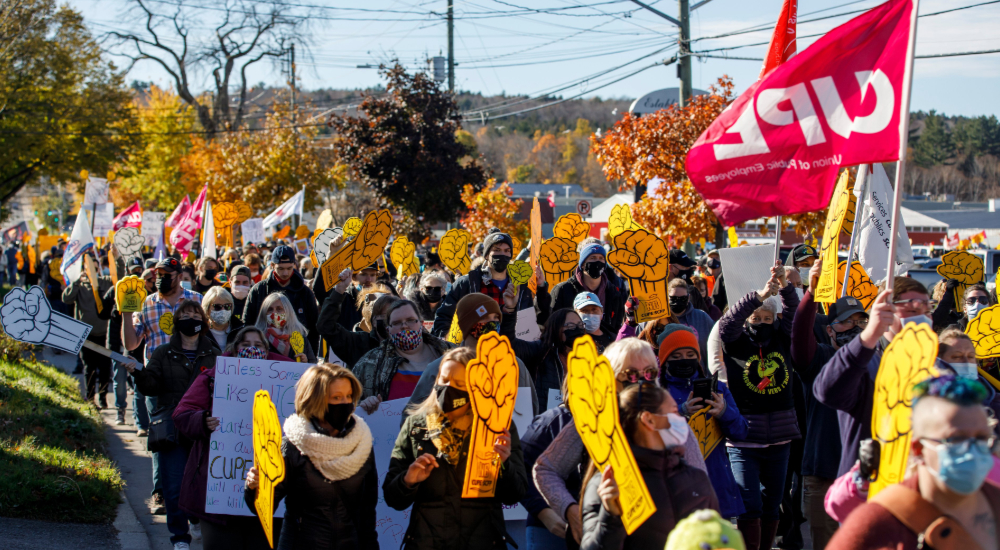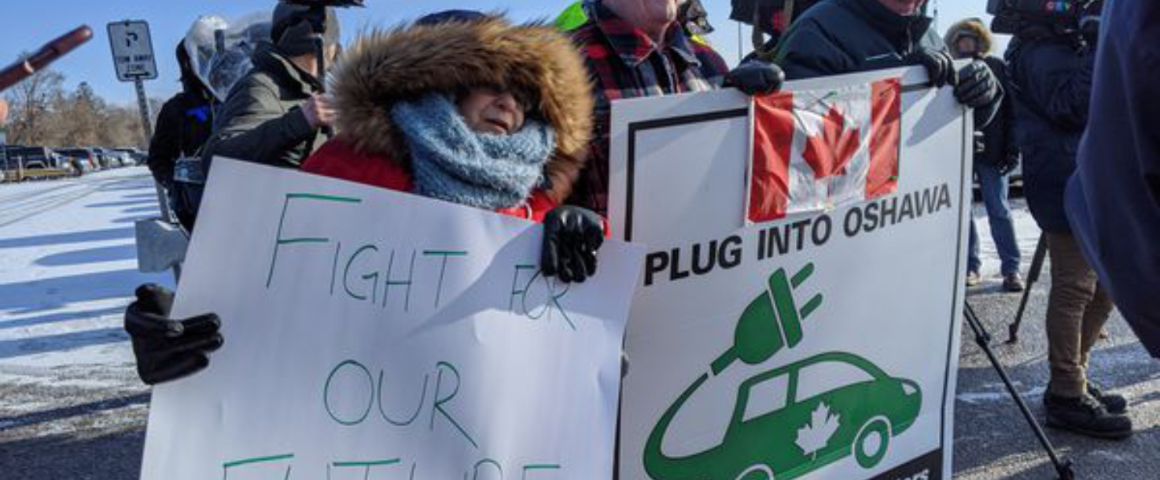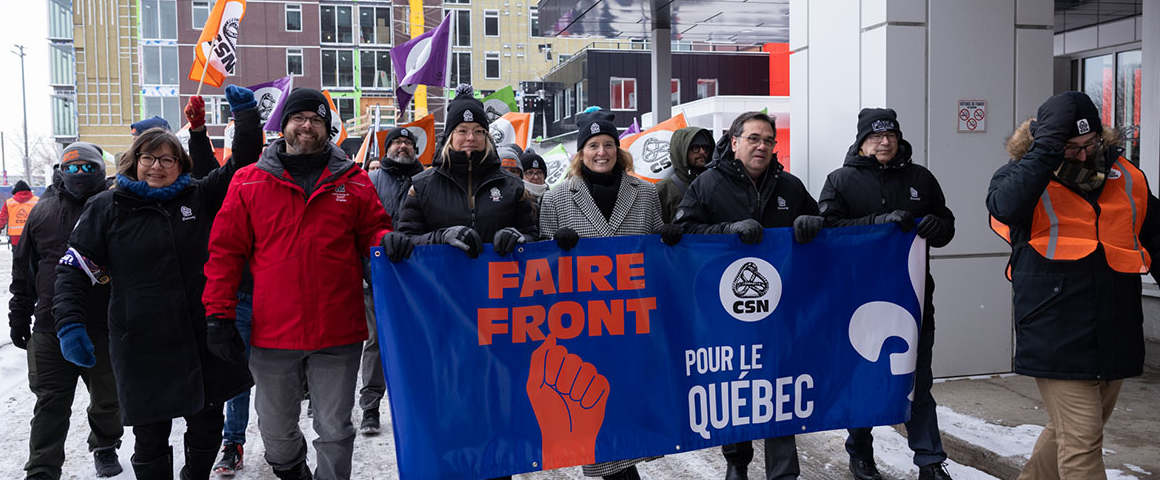Unions set higher bar as Higgs’ back to work order fails to break unity and solidarity
PV Atlantic Bureau
On November 13, the Government of New Brunswick (GNB) and the CUPE NB Centralized Bargaining Team came to an agreement for a wage offer and to place a Memorandum of Agreement (MOA) on pensions. All striking locals returned back to work and each local began voting on the offered agreements.
CUPE members launched the strike on October 29, with a demand for a five percent annual wage increase over four years to stay in line with the increasing cost of living (with inflation rates nearing five percent in NB). In the bargaining process, CUPE reduced its demands to three percent over four years. Even after this compromise, GNB demanded two percent over five years along with changes to the pension plan of some locals from defined benefit to shared risk. New Brunswick’s shared risk pension scheme represents a weakening of defined benefit pensions. The new pension includes a fixed rate for employer contributions with a defined basic retirement income, but with “extra” income only paid according to the plan’s performance.
Public support for CUPE NB and the striking locals has been immense. A rally in Fredericton on November 2 saw two columns of CUPE members and supporters descend on the Legislative Assembly. An estimated 5,000 people attended the rally. A second rally on November 12 brought roughly 1,500 people together at the Legislative Assembly. A recent poll by Stratcom found that 82 percent of people surveyed support CUPE’s demands.
CUPE was notably supported by many parents who rejected online learning, an option that was developed in the context of the COVID-19 pandemic. By the last week of the strike, an informal group of school students were organizing a province-wide virtual walkout protest entitled “School Off, Strike On!”
Morale on the picket lines has been high and picketers have received tremendous support with honks, waves and members of the public standing with them on the picket lines. “The level of support for our members has been incredible. From cars honking as they drive by to local businesses donating food and coffee to our members, there’s a real community feeling out there on the lines,” said CUPE NB president Stephen Drost.
On November 11, the New Brunswick Common Front for Social Justice, an anti-poverty non-profit organization, held a CUPE solidarity coordination meeting with pro-labour groups in the wider community to build up the coalition of its allies. The Fredericton Club of the Communist Party of Canada was present at this meeting and offered support with a letter-writing campaign which ended with 31 organizations signing on in solidarity with CUPE and “to condemn the use of the Emergency Measures Act to criminalize the strike action of over 2,000 healthcare workers in New Brunswick.”
As People’s Voice goes to press, the final details of the government’s last offer have not yet been made public. At a press conference on November 19, CUPE NB announced that 10 out of 11 locals accepted the government’s offer. Local 1253 (New Brunswick Council of School District Unions) rejected the agreement due to concerns over the proposed shared risk pension plan. CUPE NB President Stephen Drost vowed that the other locals would support 1253 as they return to the bargaining table.
In what was essentially a union-busting propaganda campaign, the government spent public funds on a series of advertisements in both Irving family-controlled media and digital media with the intention of breaking the solidarity of the strikers and public supporters. Despite all obvious efforts to gaslight the people of the province and turn public perception against the union, Premier Blaine Higgs offered this mediocre attempt at diplomatic language upon the conclusion of negotiations: “I congratulate and thank the negotiating teams from both sides for their hard work and dedication in helping us achieve these tentative agreements. It is through their perseverance and genuine determination on both sides to do what is right for our employees and all residents that we have been able to reach an agreement.”
In the end, CUPE won the following in the five-year contracts for the striking locals:
- Wage increases of two percent per year plus an additional $0.25 per hour each year
- Retroactive pay based on these wage increases for the term of the contract
- Equal pay for equal work for casual employees, ensuring that casuals are paid 100 percent of the rate of pay
- A number of local issues previously agreed to and signed off by the parties
It is vital to note however that the wage increase won for this year actually goes below the roughly five percent inflation rate currently in effect. If this continues, the pay increases that the union won will not be above the cost of living at all and we may well see a return to collective action when this agreement expires. Since some locals had already been without a contract for years and the agreement ratified will be applied retroactively, that collective action may happen sooner rather than later, especially if CUPE has to negotiate with the same Conservative government that has already pushed them to strike once.
The current high rate of inflation — not seen in decades — is something workers across Canada must take into account as they move into bargaining with their employers. A raise of less than five percent this year (the current rate of inflation) means a pay cut.
The working people of New Brunswick, having lived through the trials of the pandemic together, clearly recognize the importance of this labour action and its broader implications for confronting the austerity measures of the current government. While Higgs attempts to spin his position into a win for the Conservatives and repair his abysmal favourability rating, public sector workers have won a victory. They have broken the government’s wage mandate and set a benchmark for New Brunswick.
Public sector workers will not accept wage increases below the cost of living. The union has sent a clear message to the people of New Brunswick: when we fight together, we can win.
[hr gap=”10″]
Get People’s Voice delivered to your door or inbox!
If you found this article useful, please consider subscribing to People’s Voice.
We are 100% reader-supported, with no corporate or government funding.




